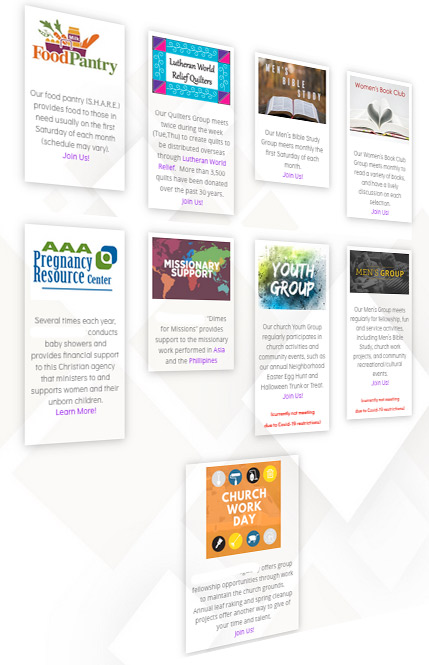
No More Potlucks
Okay, the title is a bit misleading. I’m not going to be talking about healthy diets and the evils of green jello salad. Rather, I’m referring to part of a conversation I had not long ago with a member as we worked through a new website for her church. The pastor and leaders of the church wanted to take all the content from their old, non-functioning, website and simply pour it into the structural framework of the new site. I attempted to explain the reason that was not a good practice for developing a website that helps connect non-members to her church. At issue in this conversation was the listing of all the monthly activities and top on her list was the monthly potluck. she commented, “Don’t you think people in the community would like to know about our monthly potlucks? They have to eat too.”
The problem isn’t with potlucks or most of the activities that our congregations use to fill their calendars. The problem is the assumption that people will connect with our congregations because of a list of activities offered by the church. Feature focused outreach worked when we were trying to reach disenfranchised Christians. It doesn’t work in our current context. People are not browsing church websites looking for a good potluck to crash for Sunday dinner. They aren’t checking out listings for church choirs to visit for a free concert. The shift in modern advertising has been away from features and onto benefits. Features focus on what a church has to offer. Benefits focus on why the church is doing what it is doing.
For example, a website that promotes two different styles of worship at three different times on Sunday morning are advertising based on features. A website that emphasizes the Sunday gathering as an event to receive God’s grace and serve in community are emphasizing benefits. The benefits approach informs the visitor as to why your ministry values its activities and invites them to journey based upon that shared value.
A second reason to eliminate the laundry list of activities on your main website is that the guest often cannot prioritize the list. To the non-believer, all church activity should be religious activity. Therefore, when faced with a long list of activities, they are unable to choose the best first step, and so they often choose not to take any step. The main landing page of the congregation should have a clear focus on guiding the visitor to their first visit to the congregation. To be successful at that task the website should present a clear response to the following four questions being asked by most first-time visitors:
- What is the time of the service
- How do we find the church and get a seat in the church?
- What will be expected of me during my visit?
- How will my children be received?
Secondary concerns include:
- What is the pastor like?
- How is his preaching?
- Do they care about the things I care about?
So, is there a place for a listing of ministries and non-Sunday morning related events? Yes, put them in the members’ section of the website. The website needs to communicate to the membership, as well as, the first time visitors. However, unlike first time visitors, members are motivated to look for information. So have the default landing page of the website be focused on the first-time guests and then have a members section dedicated to the needs of the existing congregation.

